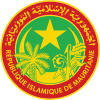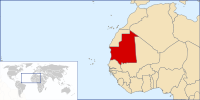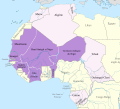Portal:Mauritania
The Mauritania Portal - بوابة موريتانيا
Mauritania, officially the Islamic Republic of Mauritania (Arabic: الجمهورية الإسلامية الموريتانية, al-Jumhūrīyah al-Islāmīyah al-Mūrītānīyah), is a sovereign country in Northwest Africa. It is bordered by the Atlantic Ocean to the west, Western Sahara to the north and northwest, Algeria to the northeast, Mali to the east and southeast, and Senegal to the southwest. By land area Mauritania is the 11th-largest country in Africa and 28th-largest in the world; 90% of its territory is in the Sahara. Most of its population of some 4.3 million lives in the temperate south of the country, with roughly a third concentrated in the capital and largest city, Nouakchott, on the Atlantic coast. The country's name derives from the ancient Berber kingdom of Mauretania in North Africa within the ancient Maghreb. Berbers occupied what is now Mauritania beginning in the third century AD. Arabs under the Umayyad Caliphate conquered the area in the late seventh century, bringing Islam, Arab culture, and the Arabic language. In the early 20th century, Mauritania was colonized by France as part of French West Africa. It achieved independence in 1960, but has since experienced recurrent coups and periods of military dictatorship. The most recent coup, in 2008, was led by General Mohamed Ould Abdel Aziz, who won subsequent presidential elections in 2009 and 2014. He was succeeded by Mohamed Ould Ghazouani following the 2019 elections, which were considered Mauritania's first peaceful transition of power since independence. Mauritania is culturally and politically part of the Arab world; it is a member of the Arab League and Arabic is the official language. The official religion is Islam, and almost all inhabitants are Sunni Muslims. Despite its prevailing Arab identity, Mauritanian society is multiethnic; the Bidhan, or so-called "white moors", make up 30% of the population, while the Haratin, or so-called "black moors", comprise 40%. Both groups reflect a fusion of Arab-Berber ethnicity, language, and culture. The remaining 30% of the population comprises various sub-Saharan ethnic groups. Despite an abundance of natural resources, including iron ore and petroleum, Mauritania remains poor; its economy is based primarily on agriculture, livestock, and fishing. Mauritania is generally seen as having a poor human rights record, and is particularly censured for the perpetuation of slavery as an institution within Mauritanian society, with an estimation by the 2018 Global Slavery Index of about 90,000 slaves in the country (or 2.1% of the population). (Full article...) Selected article -The Serer people are a West African ethnoreligious group. They are the third-largest ethnic group in Senegal, making up 15% of the Senegalese population. They are also found in northern Gambia and southern Mauritania. The Serer people originated in the Senegal River valley at the border of Senegal and Mauritania, moved south in the 11th and 12th century, then again in the 15th and 16th centuries as their villages were invaded and they were subjected to religious pressures. They have had a sedentary settled culture and have been known for their farming expertise and transhumant stock-raising. The Serer people have been historically noted as an ethnic group practicing elements of both matrilineality and patrilineality that long resisted the expansion of Islam, fought against jihads in the 19th century, then opposed the French colonial rule. In the 20th century, most of them converted to Islam (Sufism), but some are Christians or follow their traditional religion. The Serer society, like other ethnic groups in Senegal, has had social stratification featuring endogamous castes and slaves, although other historians, such as Thiaw, Richard and others, reject a slave culture among this group, or at least not to the same extent as other ethnic groups in the region. The Serer people are also referred to as Sérère, Sereer, Serrere, Serere, Sarer, Kegueme, Seereer and sometimes wrongly "Serre". (Full article...)This is a Good article, an article that meets a core set of high editorial standards.
 Nouakchott (/nwækˈʃɒt, nwɑː-/; French: [nwakʃɔt]; Arabic: نواكشوط, romanized: Nuwākshūṭ; Berber: Nwakcoṭ, originally derived from Berber: Nawākšūṭ, 'place of the winds') is the capital and largest city of Mauritania. Located in the southwestern part of the country, it is one of the largest cities in the Sahara. The city also serves as the administrative and economic center of Mauritania. Once a mid-sized coastal village, Nouakchott was selected as the capital for the nascent nation of Mauritania, with construction beginning in 1958. It was originally designed to accommodate a population of 15,000, but experienced significant population growth in the 1970s when many Mauritanians fled their home villages due to drought and increasing desertification. Many of the newcomers settled in slum areas of the city that were poorly maintained and extremely overcrowded. By the mid-1980s, Nouakchott's population was estimated to be between 400,000 to 500,000. (Full article...)CategoriesGeneral images -The following are images from various Mauritania-related articles on Wikipedia.
Related portalsWikiProjects
Topics in MauritaniaCities and towns
CommunesAssociated WikimediaThe following Wikimedia Foundation sister projects provide more on this subject:
Discover Wikipedia using portals | ||||||||||||||||||||||||||||||||||||||||||||||||||||||||||||||||













































